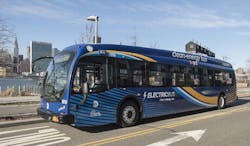DEC, NYSERDA make $24 million in Volkswagen settlement funds available for transit bus purchases
The New York State Department of Environmental Conservation (DEC) and the New York State Energy Research and Development Authority (NYSERDA) have announced more than $24 million is now available to replace diesel-powered transit buses with new all-electric transit buses, helping to improve air quality, reduce greenhouse gas emissions and promote investment in cleaner fuel technologies, among other benefits.
As part of the state's $127.7 million allocation of the federal Volkswagen Settlement, NYSERDA will administer approximately $18.4 million to fund the new electric transit buses through the New York Truck Voucher Incentive Program and the New York Power Authority (NYPA) will manage $6 million for associated charging infrastructure.
DEC Commissioner Basil Seggos said, "The transportation sector remains the largest source of greenhouse gas emissions in New York, and by taking action to remove the worst polluters from our roads, communities across the state will benefit, especially those overburdened by pollution in our cities. I thank [New York] Gov. [Andrew] Cuomo for his ongoing leadership in promoting green and renewable technologies and providing incentives to improve our air quality, reduce emissions and create a sustainable future for New York's transportation industry."
Alicia Barton, president and CEO, NYSERDA said, "The Truck Voucher Incentive Program enables us to support fleet owners in their efforts to add cleaner, more efficient trucks and buses that support the state's nation-leading efforts to reduce greenhouse gas emissions under Gov. Cuomo's Green New Deal. Supporting a statewide effort to increase the use of all-electric busses and ramping up electric vehicle charging stations gives fleet owners the confidence they need to go greener and cleaner with their vehicles and hastens our ability to ultimately eliminate New York State's carbon footprint."
Funding is available to replace existing diesel-powered transit buses with model year 2009 and older engines, which must be permanently removed from service and scrapped. Transit bus replacements are targeted at New York State government entity-owned bus fleets that have bus depots located within Potential Environmental Justice Areas (PEJAs) or operate routes that serve PEJA areas. DEC considers PEJAs to be communities of color or low-income communities that experience a disproportionate share of environmental harms such as vehicle emissions and pollution.
The transit bus replacement funds will be administered through NYSERDA's New York Truck Voucher Incentive Program (NYTVIP), which provides point-of-sale rebates to reduce the cost for businesses and municipalities that want to purchase new, clean electric or alternative-fueled vehicles (e.g., commercial trucks and buses). The rebate will initially reduce the incremental cost of purchasing all-electric transit buses by up to 100 percent and help increase the number of all-electric transit buses on New York's roadways while removing older diesel-powered vehicles trucks through a scrappage requirement. These new all-electric transit buses will be required to be housed at bus depots or operate on routes located within Environmental Justice communities.
At the governor's direction, DEC, in concert with NYSERDA, NYPA, the New York State Department of Transportation, Port Authority of New York and New Jersey and others, developed Clean Transportation NY - New York's plan to strategically invest the Volkswagen settlement resources for maximum benefit and to build on New York's national leadership on clean energy and climate change. The funds were secured to mitigate damages from the Volkswagen emissions cheating scandal through the federal settlement with Volkswagen. The state's leveraged investment of settlement funds is anticipated to result in at least $300 million of clean vehicles and infrastructure on New York's roadways. The transportation sector is currently the largest source of greenhouse gas emissions in New York, representing approximately 34 percent of the state's total emissions.
In alphabetical order, the following 18 New York State government entities are potentially eligible under the program: Broome County Transit; Capital District Transportation Authority; Central New York Regional Transportation Authority; Chemung County (C Tran); city of Long Beach, New York State Department of Transportation; Clinton County Public Transportation; Dutchess County Public Transit; Greater Glens Falls Transit; Huntington Area Rapid Transit; Nassau Inter-City Express; Niagara Frontier Transportation Authority; Port Authority of New York and New Jersey; Rochester-Genesee Regional Transit Authority; Suffolk County Transportation; Tompkins Consolidated Area Transit; Transport of Rockland; Ulster County Area Transit; and Westchester County Bee-Line Bus System.
NYPA President and CEO Gil C. Quiniones said, "We are pleased to be working with DEC and multiple transit agencies to implement charging solutions for their new electric bus fleet deployments. The greening of public buses, with their high mileage and extensive travel in populated urban areas, is a key element in New York State's strategy for making significant air quality improvements and meeting established carbon reduction goals. And NYPA's expertise with the deployment of fast chargers, particularly under our EVolveNY program, directly applies to the electrification of heavy-duty fleets."
New York State Department of Transportation Commissioner Marie Therese Dominguez said, "Creating a transportation network that is safe, reliable and environmentally sustainable is at the heart of DOT's core mission and this funding will help to achieve that goal. Under Governor Cuomo's leadership, New York State is making smart investments that spur innovation in transportation, while growing the economy and creating a greener future for all New Yorkers."



